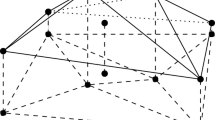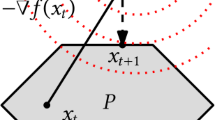Abstract
We develop a new dependent randomized rounding method for approximation of a number of optimization problems with integral assignment constraints. The core of the method is a simple, intuitive, and computationally efficient geometric rounding that simultaneously rounds multiple points in a multi-dimensional simplex to its vertices. Using this method we obtain in a systematic way known as well as new results for the hub location, metric labeling, winner determination and consistent labeling problems. A comprehensive comparison to the dependent randomized rounding method developed by Kleinberg and Tardos (J. ACM 49(5):616–639, 2002) and its variants is also conducted. Overall, our geometric rounding provides a simple and effective alternative for rounding various integer optimization problems.
Similar content being viewed by others
References
Ageev AA, Sviridenko MI (2004) Pipage rounding: a new method of constructing algorithms with proven performance guarantee. J Comb Optim 8:307–328
Bartal Y (1996) Probabilistic approximation of metric spaces and its algorithmic applications. In: FOCS ’96: proceedings of the 37th annual symposium on foundations of computer science, Washington, DC, USA, 1996. IEEE Comput Soc, Los Alamitos, p 184
Berman P, Krysta P (2003) Optimizing misdirection. In: SODA ’03: proceedings of the fourteenth annual ACM-SIAM symposium on discrete algorithms, Philadelphia, PA, USA, 2003. Soc for Industr & Appl Math, Philadelphia, pp 192–201
Bertsimas D, Vohra R (1998) Rounding algorithms for covering problems. Math Program 80(1):63–89
Bertsimas D, Teo C, Vohra R (1999a) Analysis of lp relaxations for multiway and multicut problems. Networks 34(2):102–114
Bertsimas D, Teo C, Vohra R (1999b) On dependent randomized rounding algorithms. Oper Res Lett 24(3):105–114
Bryan D, O’Kelly ME (1999) Hub-and-spoke networks in air transportation: an analytical review. J Reg Sci 39(2):275–295
Calinescu G, Karloff H, Rabani Y (1998) An improved approximation algorithm for multiway cut. In: STOC ’98: proceedings of the thirtieth annual ACM symposium on theory of computing, New York, NY, USA, 1998. ACM, New York, pp 48–52
Campbell JF (1996) Hub location and the p-hub median problem. Oper Res 44:923–935
Chekuri C, Khanna S, Naor J, Zosin L (2001) Approximation algorithms for the metric labeling problem via a new linear programming formulation. In: Proceedings of the twelfth annual ACM-SIAM symposium on discrete algorithms (SODA), 2001
Devroye L (1986) Non-uniform random variate generation
Dobzinski S, Nisan N, Schapira M (2005) Approximation algorithms for combinatorial auctions with complement free bidders. In: Proceedings of the thirty-seventh annual ACM symposium on theory of computing (STOC), pp 610–618
Feige U (1998) A threshold of ln n for approximating set cover. J ACM 45(4):634–652
Gandhi R, Khuller S, Parthasarathy S, Srinivasan A (2006) Dependent rounding and its applications to approximation algorithms. J ACM 53(3):324–360
Ge D (2009) Geometric rounding: theory and application. PhD thesis
Goemans MX, Williamson DP (1995a) Improved approximation algorithms for maximum cut and satisfiability problems using semidefinite programming. J ACM 42:1115–1145
Goemans MX, Williamson DP (1995b) New \(\frac{3}{4}\)-approximation algorithms for the maximum satisfiability problem. SIAM J Discrete Math 7(4):565–666
Halldórsson M (1998) Approximations of independent sets in graphs. In: APPROX ’98: proceedings of the international workshop on approximation algorithms for combinatorial optimization, London, UK, 1998. Springer, Berlin, pp 1–13
Hastad J (1999) Clique is hard to approximate within n 1−ε. Acta Math 182:105–142
Hochbaum DS (1982) Approximation algorithms for the set covering and vertex cover problems. SIAM J Comput 11(3):555–556
Kleinberg J, Tardos É (2002) Approximation algorithms for classification problems with pairwise relationships: metric labeling and Markov random fields. J ACM 49(5):616–639
Krauthgamer R, Roughgarden T (2008) Metric clustering via consistent labeling. In: SODA ’08: proceedings of the nineteenth annual ACM-SIAM symposium on discrete algorithms, Philadelphia, PA, USA, 2008. Soc for Industr & Appl Math, Philadelphia, pp 809–818
Lehmann DJ, O’Callaghan LI, Shoham Y (1999) Truth revelation in approximately efficient combinatorial auctions. In: ACM conference on electronic commerce, pp 96–102
O’Kelly ME (1987) A quadratic integer program for the location of interacting hub facilities. Eur J Oper Res 33
O’Kelly ME, Skorin-Kapov J, Skorin-Kapov D (1995) Lower bounds for the hub location problem. Manage Sci 41:713–728
Raghavan P (1988) Probabilistic construction of deterministic algorithms: approximating packing integer programs. J Comput Syst Sci 37(2):130–143
Raghavan P, Thompson CD (1987) Randomized rounding: a technique for provably good algorithms and algorithmic proofs. Combinatorica 7:365–374
Ross SM (2006) Introduction to probability models, 9th edn. Academic Press, Orlando
Shmoys DB, Tardos É (1993) An approximation algorithm for the generalized assignment problem. Math Program 62(3):461–474
Srinivasan A (1996) An extension of the lovász local lemma, and its applications to integer programming. In: SODA ’96: proceedings of the seventh annual ACM-SIAM symposium on discrete algorithms, Philadelphia, PA, USA, pp 6–15
Author information
Authors and Affiliations
Corresponding author
Additional information
This research is supported by the Boeing Company.
Rights and permissions
About this article
Cite this article
Ge, D., He, S., Ye, Y. et al. Geometric rounding: a dependent randomized rounding scheme. J Comb Optim 22, 699–725 (2011). https://doi.org/10.1007/s10878-010-9320-z
Published:
Issue Date:
DOI: https://doi.org/10.1007/s10878-010-9320-z




